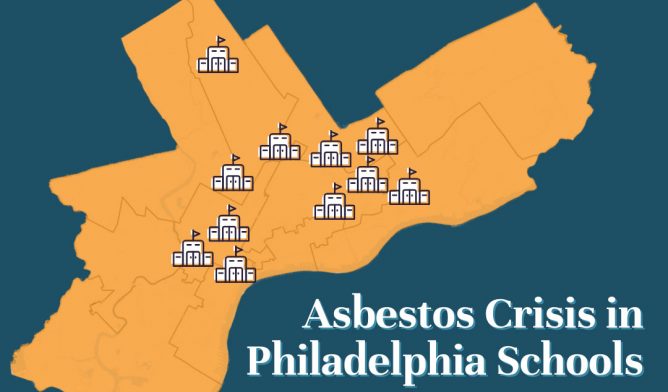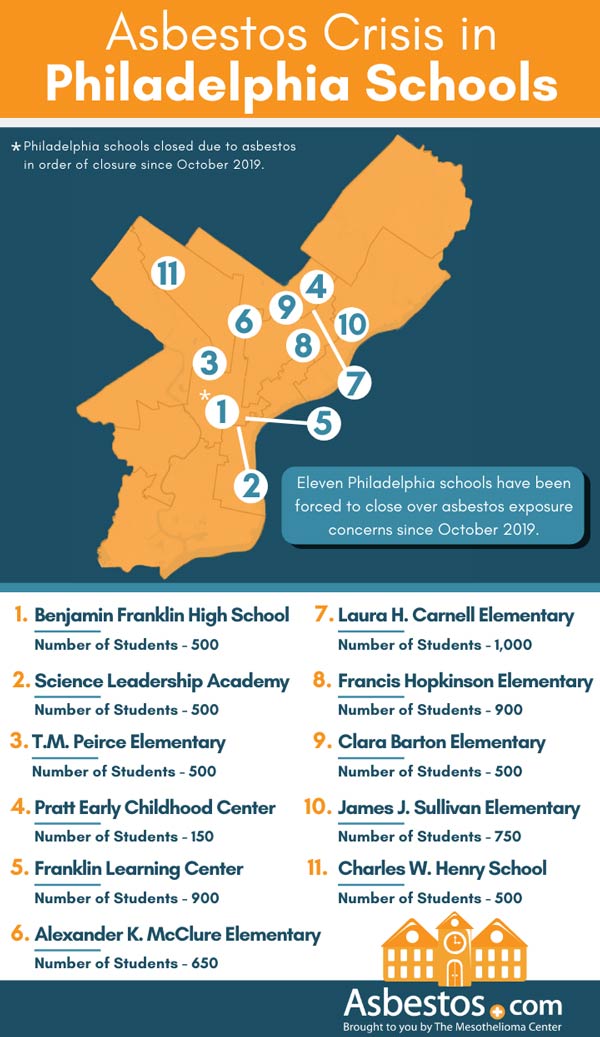Timeline: Asbestos Crisis in Philadelphia Schools
Awareness & ResearchWritten by Michelle Whitmer | Edited By Walter Pacheco

The Philadelphia School District has become the epicenter of the national issue of toxic asbestos in U.S. schools.
Since October 2019, eleven Philadelphia schools have partially or fully closed for remediation of damaged asbestos materials.
The Philadelphia School District will spend $14 million to address the ongoing asbestos crisis that made headlines last fall.
Superintendent Dr. William Hite Jr. said approximately 80% of Philadelphia schools were built prior to 1978 and are likely to contain asbestos.
The school district’s asbestos problems have potentially already caused serious health consequences.

Major Events in Philadelphia Schools Asbestos Crisis
The following timeline highlights the ongoing asbestos concerns in Philadelphia schools.
-
May 2018
The problem first came to light in May 2018 when The Philadelphia Inquirer published its investigation into environmental hazards at local schools. At the time, school officials said it would take $3 billion and 10 years to resolve the problem.
-
August 2019
School teacher Lea DiRusso was diagnosed with mesothelioma cancer at 51 years old after teaching at two asbestos-contaminated Philadelphia schools for nearly 30 years. One of her classrooms at Meredith Elementary contained damaged asbestos pipe insulation.
-
September 2019
A $37 million renovation project was underway in September 2019 when workers found damaged asbestos materials in Benjamin Franklin High School and Science Leadership Academy.
-
Sept. 11, 2019
The Philadelphia Federation of Teachers held a press conference on Sept. 11 to announce that a teacher (DiRusso) had developed mesothelioma and warned other teachers about the risks of working around asbestos products in schools.
-
Oct. 4, 2019
Benjamin Franklin High School and Science Leadership Academy shut down on Oct. 4. Damaged asbestos ductwork was reported a month earlier in a boiler room shared by the schools. However, an investigation revealed the school had been improperly abating asbestos since Aug. 2018. About a thousand students were relocated to other schools.
-
Oct. 24, 2019
T.M. Peirce Elementary in north Philadelphia was partially closed in late October after asbestos was found in the gym. The school fully closed and relocated students to a temporary building in December. It remains closed.
-
November 2019
On Nov. 12, damaged asbestos materials were found in the boiler room and near heating units in Pratt Early Childhood Center. The school was quickly closed and students and staff were relocated. It remains closed.
-
Dec. 10, 2019
Following three rounds of conventional chemotherapy, DiRusso underwent cytoreductive surgery and heated intraperitoneal chemotherapy. Her mesothelioma had spread to her ovaries, uterus and small bowel.
-
Dec. 17, 2019
Franklin Learning Center closed Dec. 17 after damaged asbestos materials were found in an air shaft connecting the attic to the fan room. Franklin Learning Center reopened on Jan. 2.
-
Dec. 19, 2019
Alexander K. McClure Elementary and Laura H. Carnell Elementary were closed on Dec. 19. Asbestos was found in more than a dozen locations within McClure, including classrooms, hallways and stairwells. Carnell reopened on Jan. 13.
-
Jan. 15, 2020
McClure Elementary reopened on Jan. 15 but closed again two days later after air sample tests revealed dangerous levels of airborne asbestos. Parents, teachers and students protested in front of McClure on Jan. 17 demanding safer conditions. Further cleanup continued, and the school reopened on Jan. 29.
-
Jan. 21, 2020
Philadelphia Federation of Teachers filed a lawsuit on Jan. 21 against the school district for insufficient asbestos testing and negligence for failing to take appropriate action.
-
Feb. 2, 2020
Students, parents and staff from Franklin Learning Center gathered outside the school to protest environmental conditions inside the building, claiming the work was incomplete.
-
Feb. 3, 2020
Francis Hopkinson Elementary was closed indefinitely on Feb. 3 after a district walk-through found 55 locations with asbestos contamination, including the cafeteria. Additionally, damaged asbestos pipe insulation was found in an unoccupied room at the school.
-
Feb. 13, 2020
Clara Barton Elementary and James J. Sullivan Elementary closed on Feb. 13 after asbestos was found in various locations throughout the schools. Barton reopened a week later, while Sullivan is expected to reopen the last week of February.
-
Feb. 18, 2020
Benjamin Franklin High School and the Science Leadership Academy reopened after closing on Oct. 4, 2019.
-
Feb. 20, 2020
Charles W. Henry School closed off a classroom on Feb. 20 after a leak damaged asbestos pipe insulation inside the room. The room will remain closed to students and staff until the damage is fixed.
-
Feb. 24, 2020
Clara Barton Elementary reopened after being closed for more than a week.
-
Feb. 26, 2020
The city of Philadelphia announced it had hired an environmental firm to help address the asbestos issues in local schools. The city will pay Arc Environmental, a Baltimore-based firm, up to $90,000 through the end of the school year to assist the district in establishing asbestos abatement protocols.
-
Feb. 27, 2020
The Philadelphia School Board signed off on an $850,000 settlement with DiRusso, who was diagnosed with mesothelioma after teaching in city schools for 30 years.
District Needs $125M in New Funding for Remediation
Superintendent Hite explained the school district would not approve major construction projects in the future without assessing for asbestos and other dangers.
“If we’re going to do a renovation or modernization, we’re going to go in and remove all of the environmental hazards,” Hite told The Philadelphia Inquirer.
Hite said the school district needs $125 million in new funding in the next five years to remediate lead and asbestos contamination.
Teachers Union Report Calls for $200M in New Funding
The Philadelphia Federation of Teachers union released a report in May 2021 listing asbestos among five other pressing environmental hazards requiring immediate attention. Remediating these hazards will cost at least $200 million, according to the report.
This report claims the COVID-19 pandemic delayed the most recent asbestos inspections, and that prior inspections conducted in December 2019 must be completely redone because they were so poorly executed.
It also says asbestos abatement jobs conducted in Philadelphia schools from April 2020 to April 2021 found additional asbestos-containing materials not previously documented through inspections. In addition, the report said samples collected during abatement work found airborne asbestos outside supposedly contained work areas at several schools.
What Parents Can Do About Asbestos in Schools
Parents of students in Philadelphia schools can educate their children about the dangers of asbestos exposure and how to identify products that are likely to contain asbestos so they can avoid them.
Asbestos may be found in floor and ceiling tiles, and in insulation applied to pipes, boilers, walls and ceilings.
If a student suspects they’ve found damaged asbestos materials at school, they should tell their parents.
Parents should report the issue to the local school district and the Pennsylvania Department of Environmental Protection.




